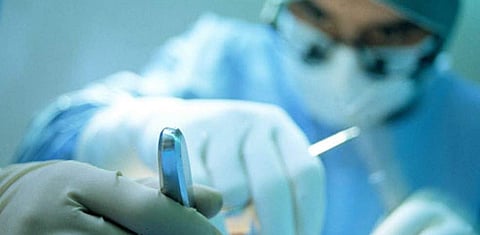

BENGALURU: A hospital in Bengaluru claims to have operated on a rare group of tumours which is said to be the 35th case described in 'world literature'.
The 51-year-old wife of a poor farmer from West Bengal after nagging pain and swelling in front of her ears went to the doctor in her native Siliguri to find that there was a tumour and even got it operated on.
However, the swelling increased in size and the pain did not abate. She was then sent to Bengaluru's Sri Shankara Cancer Hospital for treatment. The doctors at Shankara found that the earlier hospital had thought it to be a salivary gland tumour and was operated upon but couldn't remove the entire tumour leading to further complications.
"The doctors at our hospital did a detailed evaluation and found to have a large tumour in front of the left ear that had expanded to involve the infratemporal fossa (space behind the upper jaw) and middle skull base (a thin plate of bone separating the upper jaw from the brain and its coverings). The tumour, we found could be operable and also be removed completely" said Dr Narayana Subramaniam, Consultant and Head of Department, Head &Neck Oncology, who led the team and performed the challenging surgery that lasted over 8 hours.
The risks of the surgery were potentially life-threatening, including massive bleeding, leak of cerebrospinal fluid, and infection spreading to the coverings of the brain (meningitis). However, she tolerated the surgery well and was discharged on day 10, pain-free, with normal mouth opening, the position of the teeth, speech and swallowing.
The pathology report showed that the tumour was temporomandibular joint chondrosarcoma, an extremely rare cancer arising from the cartilage of the temporomandibular joint (the joint in front of the ear which controls the opening and closing of the lower jaw). Sarcomas are a rare group of tumours that arise from cells that form bone, muscle, blood vessels and other connective tissue. This type of sarcoma is exceptionally rare because of the type of cells in the cartilage of the temporomandibular joint and the development pattern of the jaw in early fetal life.
The doctors said that as it was removed completely, she required no further treatment and has an excellent chance of cure. Skull base cancer treatment is a complicated field of surgery requiring expertise in multiple disciplines (head and neck surgery, neurosurgery, reconstructive surgery, pathology, radiation and medical oncology).
"These are difficult to diagnose and treat because they are rare, the anatomy of this region is very complex, and acquiring expertise to treat them needs specialised training; however, when treated appropriately these patients have a good chance of cure, with a long and meaningful life ahead of them," Dr Narayana explained
Meanwhile, the doctors at Shankara said that in the eastern part of India there is no major cancer care centre but very soon there will be one set up there. The hospital authorities said that "thanks to Subroto Bagchi, co-founder of Mindtree it will soon have a Bagchi-Shankara Cancer Hospital at Bhubaneswar by the middle of next year and the hospital will be managed by Shankara hospital," a release from Shankara said.